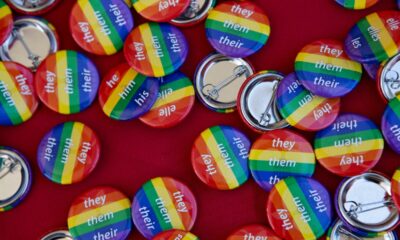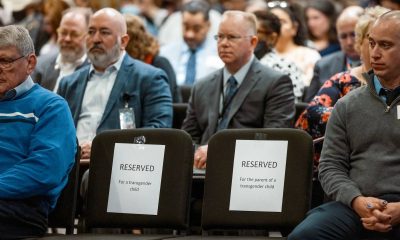Texas
Texas students push back against book bans for censoring LGBTQ, racial justice issues
Students are forming banned-book clubs and distribution drives to contest restrictions that focus mostly on LGBTQ and racial themes.
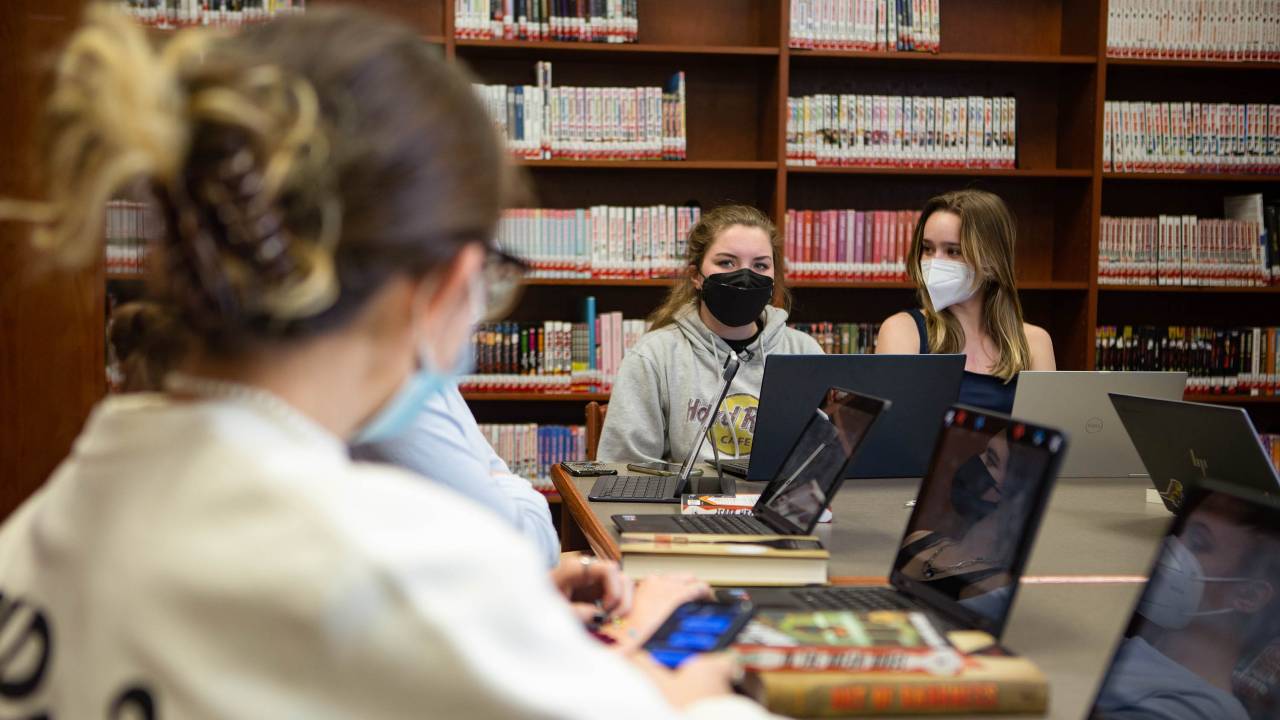
This article originally appeared in The Texas Tribune
 For high school senior Gabrielle Izu, Texas’ public school book bans feel personal.
For high school senior Gabrielle Izu, Texas’ public school book bans feel personal.
The books Texas is targeting — mainly novels that focus on discussions of race, sexual orientation and gender identity — tell the tale of Izu’s past and future. The 17-year-old high school student is Asian American, Black and Hispanic and bisexual, and she hates to see her identities or her peers’ censored.
“I ignored [my sexuality] for a really long time. And I think that as a young girl, if a book showed me that this is a life that could be lived, I could have had a lot more peace and coming to terms with bisexuality,” said Izu, who attends James E. Taylor High School in the Katy Independent School District near Houston.
Here and there, Texas students are forming their own book clubs to read what adults want banned. Books like Margaret Atwood’s “The Handmaid’s Tale,” Ashley Hope Perez’s “Out of Darkness” and Carmen Maria Machado’s “In the Dream House.” Books that, until last fall, were easy to find and access.
In Katy ISD, students have distributed hundreds of novels challenged by adults in Texas. They’re getting the books free of charge from a political advocacy organization and publishers. And in Leander ISD near Austin, students are coming together in a banned-book club to discuss those books. Some students are starting to attend school board meetings to fight for the freedom to choose what to read.
More than a hundred Katy ISD students of a variety of ages, races and gender identities met after school to discuss the bans and pick up contested novels. Among the books they’re reading is Kalynn Bayron’s “Cinderella is Dead,” a novel that follows a queer, Black teenager’s coming-of-age story. Izu, who saw herself reflected in the book, said her heart broke when Texas schools targeted it for a ban.
“It felt like my identity was seen as dangerous because of the banning of a story like that. What about my story? Am I seen as a bad influence?” Izu said. “Am I seen as something that should be shamed?”
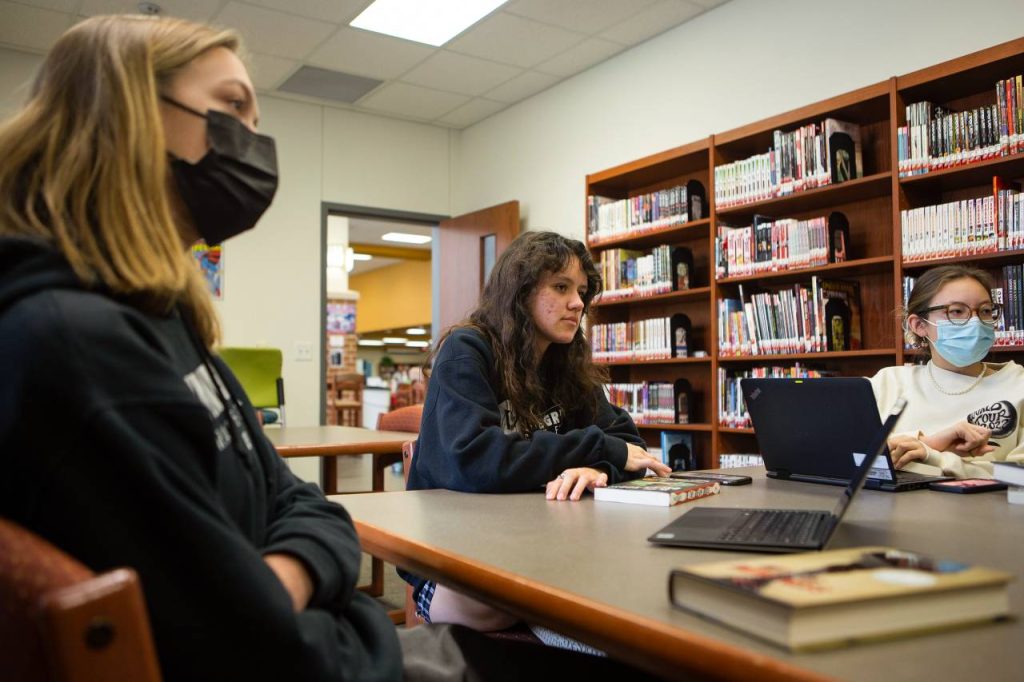
Texas parents and politicians say they are protecting students with book bans. Many students, including Cameron Samuels, a senior at Seven Lakes High School in Katy ISD, aren’t buying it.
“It’s clear that these books address issues of race and LGBTQ identities, and that is the exact reason that certain people are seeking to remove these books from libraries and prohibit students from accessing them,” said Samuels, who helped with distribution efforts. “And these policies have dire consequences for us because they keep us struggling with our queer identities.”
Katy ISD students showed strong support at the events, Samuels said. But not all parents are happy, and some have even tried to enter the school to disturb student discussions on Texas’ book bans, they said.
“As far as I have seen, parents have been the center focus of the movement to ban books and remove them from libraries, where students have been at the forefront of advocating for having access to these books,” Samuels said.
Books on race are also targeted, especially after Texas lawmakers passed a social studies law to target what they referred to as critical race theory, though the law does not specifically mention it. Critical race theory is a university-level discipline that considers how racism is embedded in policies and systems. The new law states that a teacher “may not be compelled to discuss a widely debated and currently controversial issue of public policy or social affairs” in public schools. While this law primarily applies to social studies curriculum, some are also trying to apply it to any book found in a school library.
Katy ISD removed, temporarily, Jerry Craft’s “New Kid,” which explores how more subtle or indirect discrimination impacts Black students in a mostly white school. The school district took the action after a parents claimed the book presented harmful content about critical race theory.
The district returned “New Kid” to shelves last semester, but Samuels said only students in fifth grade and up are permitted to check it out.
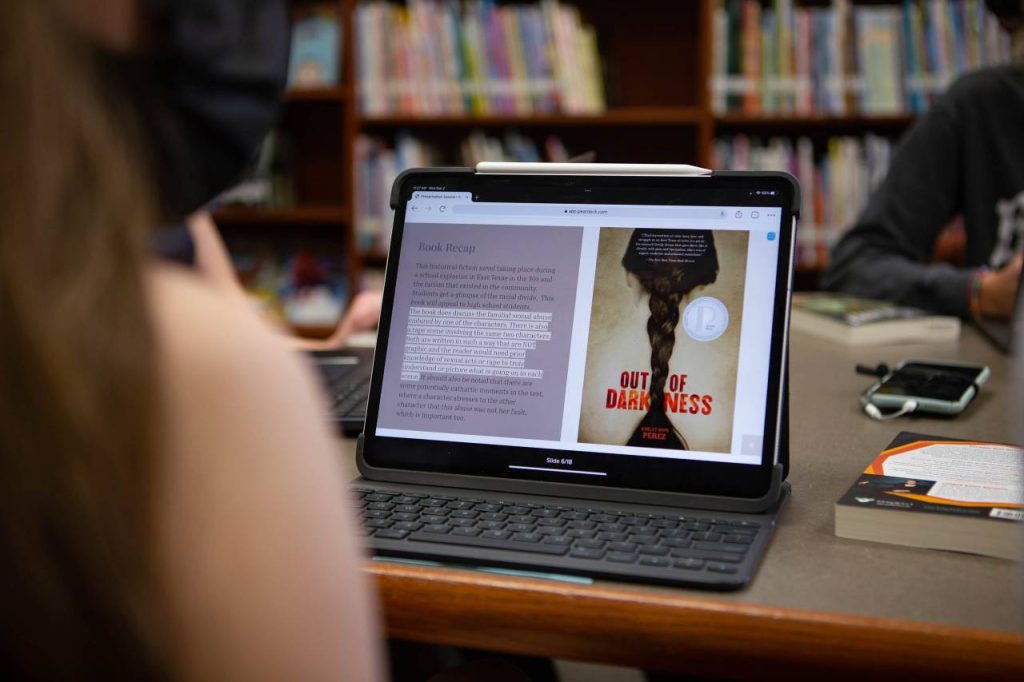
Samuels, who is nonbinary, said the novel comforted them, as they have often felt isolated as one of the few students at their school who use they/them pronouns.
“I have often felt alone and have experienced microaggressions,” Samuels said. “There’s no reason that addressing these issues should be something that students are prevented from doing or prohibited from learning about.”
Katy ISD does not allow students to distribute books the district banned. Samuels said it feels condescending that those in power decide what students can and cannot read.
“As students, we must take ownership of our education and not let others decide for us which resources we can access and which topics we can learn about,” they said.
At a recent Katy ISD school board meeting, students packed the room to call for the district to return books to libraries. Samuels and other students plan to continue to protest book bans at a Capitol rally on March 12.
“This is censorship. This is bad,” Izu said. “This is condemning things that shouldn’t be condemned.”
Book bans exploded across the state and country during this school year. In October, state Rep. Matt Krause, R-Fort Worth, called on schools to disclose whether any of about 850 book titles were in their libraries. He said books “that might make students feel discomfort” should also be identified.
Weeks later, Gov. Greg Abbott asked the Texas Education Agency to investigate the availability of “pornographic” books at school libraries.
Maghan Sadeghi, a James E. Taylor High School senior who is working with book distribution efforts, said Abbott’s statement sounds “like a bunch of ignorance.” She notes that her AP literature class requires many readings that reference sex. In “One Flew over the Cuckoo’s Nest,” it is suggested on several occasions that staff rape patients. In “Hamlet,” sex before marriage is compared to a worm invading a flower before it blooms.
“They’re OK with heterosexual scenes, heterosexual ideas. But the second something turns slightly, slightly queer, slightly homosexual, it discomforts them. It’s the same thing with [people of color] viewpoints,” Sadeghi said. “Why do we have to remove books about Black people and Asian Americans simply for the sake of white people’s comfort?”
In Leander ISD, students gather together every two weeks to answer a similar question: Should this book be banned?
Vandegrift High School sophomores Ella Scott and Alyssa Hoy created the school’s banned-book club after looking at the list of books their district aimed to ban last year. The district would remove some of their favorite books from classroom libraries, and as a result, the students began having discussions about decisions they felt the district made without them.
“I loved ‘The Handmaid’s Tale,’” Scott said, referring to Atwood’s novel about a totalitarian society that forces fertile women to be raped so they can carry to term the offspring of elite couples. It’s now one of the restricted books in her school. “I love that book. Forever. It’s one of my favorites. Seeing it on the list was definitely disorienting.”
Leander ISD has so far removed the physical copies of 11 book titles from classroom libraries, but nine of those still reside in the school’s main and digital libraries, according to Matt Mitchell, Leander ISD’s communications coordinator.
During study hall, dozens of students from all grades meet to discuss one of the banned books’ plot and purpose, as well as who should have access to its storylines. So far, they generally agree the banned books furthered their education and should be freely accessible in the classroom.
Often, the students discuss how each book introduces to them new perspectives or even historical events.
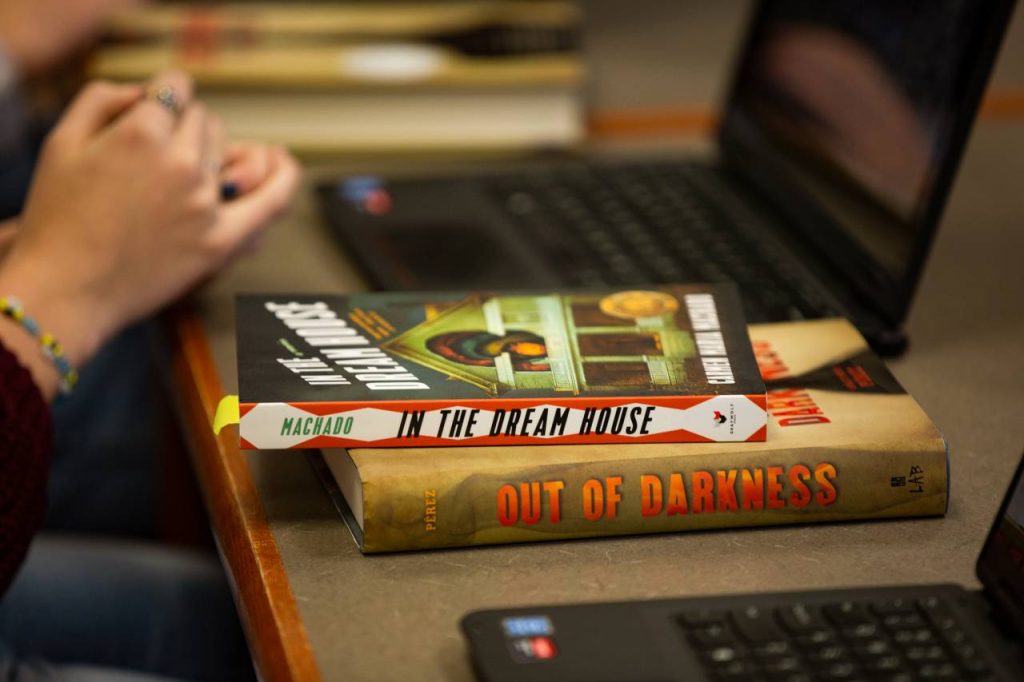
Pérez’s now-banned novel “Out of Darkness” follows a love affair between Naomi, a Mexican American high school senior, and Wash, a Black teenager, in the days before the 1937 gas explosion at the New London school, still one of the worst national disasters in history. Many book club students were unaware of this tragic event in the East Texas town of New London.
“These are very powerful stories,” Hoy said. “Most of the time, those tough decisions and tough scenes are reasons why they are so powerful and so meaningful to so many people.”
Last semester, the club had members purchase their books. Recently, the club set up an Amazon wish list to fund book purchases. In 24 hours, donated funds paid for the group’s books. Hoy said the community has supported the club through the semester.
“Eventually, we hope our club won’t be necessary,” Scott said. “We just hope that our voices and our opinions will be considered.”
Disclosure: Amazon Web Services (AWS) has been a financial supporter of The Texas Tribune, a nonprofit, nonpartisan news organization that is funded in part by donations from members, foundations and corporate sponsors. Financial supporters play no role in the Tribune’s journalism. Find a complete list of them here.
The Texas Tribune is a nonpartisan, nonprofit media organization that informs Texans — and engages with them – about public policy, politics, government and statewide issues.
Education
Feds investigate another Texas school district for its gender identity mandate
Katy ISD’s board voted this past fall to require staff to notify parents if their child wants to use a different pronoun or identifies as a different gender.
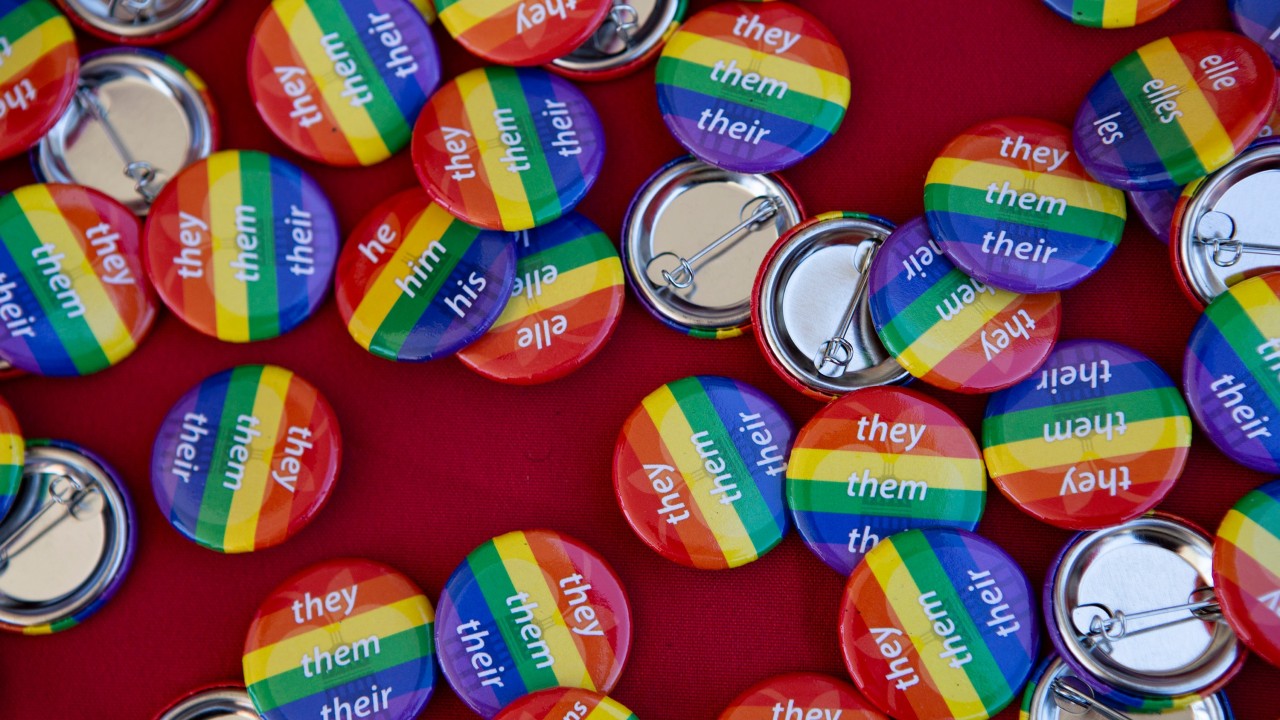
This article originally appeared in The Texas Tribune
 The U.S. Department of Education’s Office for Civil Rights opened an investigation Monday into Katy Independent School District’s gender identity policy on the basis of gender harassment under Title IX. The investigation came nine months after the Houston Landing reported that the district adopted a policy that notifies parents if their child requests to use a different name or pronouns at school.
The U.S. Department of Education’s Office for Civil Rights opened an investigation Monday into Katy Independent School District’s gender identity policy on the basis of gender harassment under Title IX. The investigation came nine months after the Houston Landing reported that the district adopted a policy that notifies parents if their child requests to use a different name or pronouns at school.
Katy ISD did not respond to a request of how many parents have been notified this year under the new policy, which requires staff to inform parents that students are transgender or ask to use different names or pronouns.
The Houston Chronicle reported in December that the district had notified parents at least 23 times since the policy was adopted.
The gender identity policy also bars schools from teaching “gender fluidity” and denies students from competing in sports with the gender they identify with, which mirrors state legislation already regulating K-12 athletics.
Students Engaged in Advancing Texas, a student-led advocacy group, filed a complaint with the U.S. Department of Education in November regarding the policy. Katy ISD graduate and member of SEAT Cameron Samuels labels the investigation as a win against the conservative policies being passed in the district.
“Elected solely on platforms to target marginalized students, far-right school board candidates accomplished exactly what they were elected to do: weaponize identity and neglect students’ educational needs,” they said.
Title IX prohibits sex-based discrimination in educational settings or federally funded activities. Gov. Greg Abbott has loudly voiced his opposition to the federal law recently ordering the Texas Education Agency to disregard the Biden administration’s expansion of Title IX.
“The district is committed to offering equal educational opportunities to our entire community,” a spokesperson from Katy ISD told the Tribune in a response to the investigation. “While we have received the OCR filing and deny any wrongdoing, we are committed to remaining fully cooperative and responsive throughout the process.”
Victor Perez, Katy ISD board president and proponent of the policy, argued that the policy was “mischaracterized” by community members as an attack on its queer and transgender students and instead relieves the burden for staff withholding information from parents. The policy was passed at a board meeting in August with a vote of 4-3 after four hours of public comment.
Alastair Parker, a member of the Cinco Ranch High School Gender-Sexuality Alliance, spoke at the board meeting in opposition to the policy.
Parker and others argued that the policy infringes on the rights of transgender kids to express themselves and opens them to potential harm if they are outed to transphobic parents or caregivers.
Johnathan Gooch from Equality Texas, a nonprofit advocacy group for LGBTQ+ Texans, said he hopes students recognize their power to report policies like this in the wake of the increasing number of legislation targeting LGBTQ+ youth.
This isn’t the first instance in Texas of a gender related policy being investigated on the federal level. Carroll ISD in Tarrant County was reported to have eight open investigations last February after it eliminated protections over race, religion, gender and sexual orientation.
There are documented mental health benefits to using preferred pronouns. A research team at the University Texas at Austin conducted a study in which they concluded that students in gender-affirming environments report 71% fewer symptoms of severe depression, a 34% decrease in reported suicidal ideation and a 65% decrease in suicide attempts.
“When students place their trust in teachers and school administration, the school has a duty to preserve that trust,” Gooch said. “That duty requires schools to ensure that no disclosure would place a student in harm’s way.”
Parker has been out as a transgender man since the seventh grade and is supported by his father, who he resides with. He acknowledged that this isn’t the case for many of his classmates as some have parents that are less accepting.
His teachers have gone by his preferred name and pronouns for his entire high school experience. But since the policy has been enacted, he has seen some of his peers go by their deadnames fearing that their parents would be notified.
Over the past year, other schools across the state have adopted similar policies.
Keller ISD, which is also in Tarrant County, passed a policy in late June that prevents students from using their preferred name and pronouns or using restrooms with the gender they identify with.
The policy was met with retaliation from the Texas American Civil Liberties Union, writing in a letter to the district that the policy is “deeply invasive and unlawful for school administrators to interrogate students’ private medical information in this way.”
As the end of the school year nears, Parker observed the policy being enforced at varying levels of severity by teachers. The passing of legislation or policy like this deters from the ongoing health crisis for queer and transgender youth and is wholly unnecessary, he said.
“If a child’s not telling their parents something like that, it’s for a reason,” he said. “I know that most of the people who are in favor of this are the ones who bounce off whatever their parents have told them to repeat.”
Disclosure: Equality Texas has been a financial supporter of The Texas Tribune, a nonprofit, nonpartisan news organization that is funded in part by donations from members, foundations and corporate sponsors. Financial supporters play no role in the Tribune’s journalism. Find a complete list of them here.
The Texas Tribune is a nonpartisan, nonprofit media organization that informs Texans — and engages with them – about public policy, politics, government and statewide issues.
Amarillo
Appeals court considers whether West Texas A&M drag show was unconstitutionally banned
University President Walter Wendler canceled a drag performance last year, claiming such shows “denigrate and demean women.”
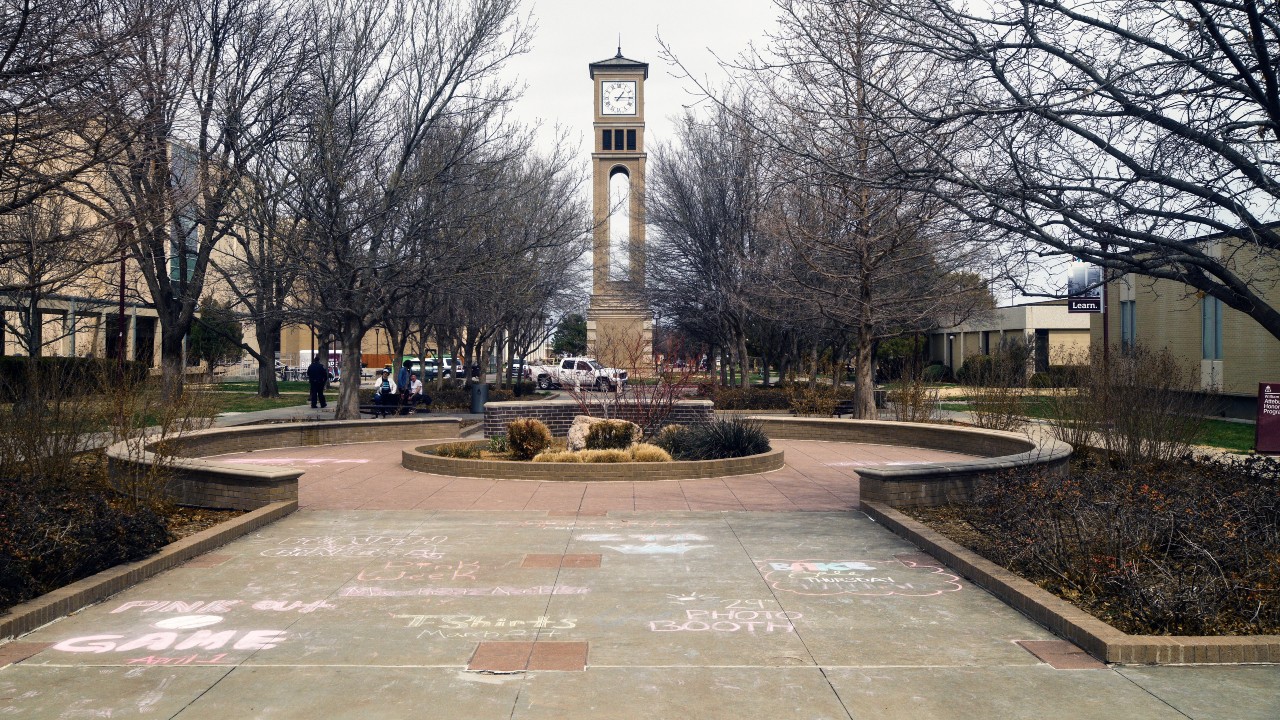
This article originally appeared in The Texas Tribune
 A federal appeals court considering whether West Texas A&M University’s president violated the First Amendment when he canceled a campus drag show last year focused many of their questions Monday on a U.S. Supreme Court ruling that upheld campus non-discrimination policies.
A federal appeals court considering whether West Texas A&M University’s president violated the First Amendment when he canceled a campus drag show last year focused many of their questions Monday on a U.S. Supreme Court ruling that upheld campus non-discrimination policies.
But the panel of three judges used that 2010 case — which said universities can require groups to admit LGBTQ+ students — to suggest that school officials could also ban drag shows because some people find the performances offensive to women.
A lawyer representing a group of West Texas A&M students who’ve twice attempted to host a drag show on campus argued before the 5th U.S. Circuit Court of Appeals Monday that President Walter Wendler discriminated based on viewpoint and censored speech when canceling the performances.
In March 2023, Wendler banned drag shows in response to a student fundraiser that featured drag performers. The president argued the performances “denigrate and demean women,” and shouldn’t be allowed on the public university’s campus.
In September, a federal judge said Wendler acted within his authority to cancel the drag show. In his opinion, U.S. District Judge Matthew Kacsmaryk wrote, at “this point in Free Speech jurisprudence, it is not clearly established that all ‘drag shows’ are categorically ‘expressive conduct.’”
Last month, students with WT Spectrum, the student group at the university, hoped to hold another drag show on campus — to show support for the LGBTQ+ community in a staunchly conservative corner of Texas.
With Wendler’s campus-wide ban still in place, the Supreme Court declined to intervene and the president again ordered the fundraiser from taking place.
The panel of judges hearing the appeal Monday were James Dennis, James Ho and Leslie Southwick.
Many of their questions centered around Christian Legal Society v. Martinez, a case in which the Supreme Court upheld a policy of the University of California, Hastings College of the Law, that bars student groups from excluding members based on status or beliefs.
In 2010, the Supreme Court affirmed that Hastings’ policy does not violate the First Amendment rights of CLS, a group of students that wanted to be officially recognized on campus while not allowing people who engage in “unrepentant homosexual conduct” from joining.
The 5th Circuit judges Monday seemed to suggest that Wendler’s ban was no different from the policy at the center of the 2010 Supreme Court case. One of the judges, who didn’t identify themselves before speaking, asked if plaintiffs intended to use the case in question to overturn CLS.
“Maybe we should overturn CLS?” one of three judges said. “Many people would like CLS overturned.”
Ho equated the policy upheld in CLS with Wendler’s drag ban. He said both intend to make everyone feel included, but the policies have the consequence of targeting one group. In CLS’ case, he said that Christians were singled out on Hastings’ campus for not allowing LGBTQ+ individuals to join. Ho said that previous groups on Hastings’ campus could exclude members, but CLS was singled out by the university’s non-discrimination policy.
JT Morris, senior attorney for the Foundation for Individual Rights and Expression who represented the students, argued that the judges were comparing “apples to oranges” between the two cases.
Morris argued CLS is about a content-neutral policy, while Wendler was clearly discriminating based on viewpoint.
“The First Amendment does not allow the government to use the subjective term ‘offensive’ to restrict speech,” Morris said.
Joseph N. Mazzara, a lawyer with the Texas Attorney General’s Office who represented Wendler, said the students had not suffered any injury as a result of the no-drag policy because there was no future event featuring drag performers planned. Additionally, Mazzara said Wendler’s policy carried no criminal penalties and students could host drag performances off campus.
Mazzara said Wendler’s ban was not a free speech violation, but rather it was akin to banning certain conduct, like skateboarding on the grounds of a monument. He said drag shows constituted conduct, not speech.
“They’re able to do everything they want to do, they’re able to say all the speech they want to [say],” Mazzara said, referring to the student group WT Spectrum. “They just can’t do this one particular thing in this one particular place.”
A judge asked Mazzara how the university would have treated drag shows put on by other student groups, such as a fraternity. The judges seemed to agree with Mazzara that Wendler’s restriction did not target a specific viewpoint.
“If a Christian legal group wanted to have a ‘Drag for Jesus’ event that would also be banned,” Mazzara said.
One judge suggested that some drag shows are offensive to the transgender community, and thus Wendler’s ban would equally protect that population from offensive performances.
Allison Marie Collins, another lawyer from the Attorney General’s Office representing other defendants named in the lawsuit, argued the appellate judges should not impose any restrictions on Texas A&M system Chancellor John Sharp or West Texas A&M Vice President for Student Affairs Christopher Thomas. She argued an injunction against Sharp or Thomas would be overbroad, because it’s clear that only Wendler has acted to stop these shows.
“Neither Chancellor Sharp nor Dr. Thomas have remotely engaged in viewpoint discrimination, exclusion from a public forum or a prior restraint complaint to speech,” Collins said.
In his rebuttal, Morris argued the plaintiffs have standing over Sharp because he has the authority over Wendler to put an end to this restriction on free speech.
“He has the authority to do what’s best for the campus,” Morris said of Sharp. “He should have put an end to this prior restraint, which shouldn’t have lasted a day, and has now lasted a year.”
Disclosure: Texas A&M University and West Texas A&M University have been financial supporters of The Texas Tribune, a nonprofit, nonpartisan news organization that is funded in part by donations from members, foundations and corporate sponsors. Financial supporters play no role in the Tribune’s journalism. Find a complete list of them here.
The Texas Tribune is a nonpartisan, nonprofit media organization that informs Texans — and engages with them – about public policy, politics, government and statewide issues.
Education
Under Katy ISD gender policy, student identities disclosed to parents 19 times since August
Public records obtained by the Houston Landing offer the first glimpse at how often the new, hotly contested policy has been used to disclose LGBTQ+ students’ identities to parents — even if the students aren’t ready.
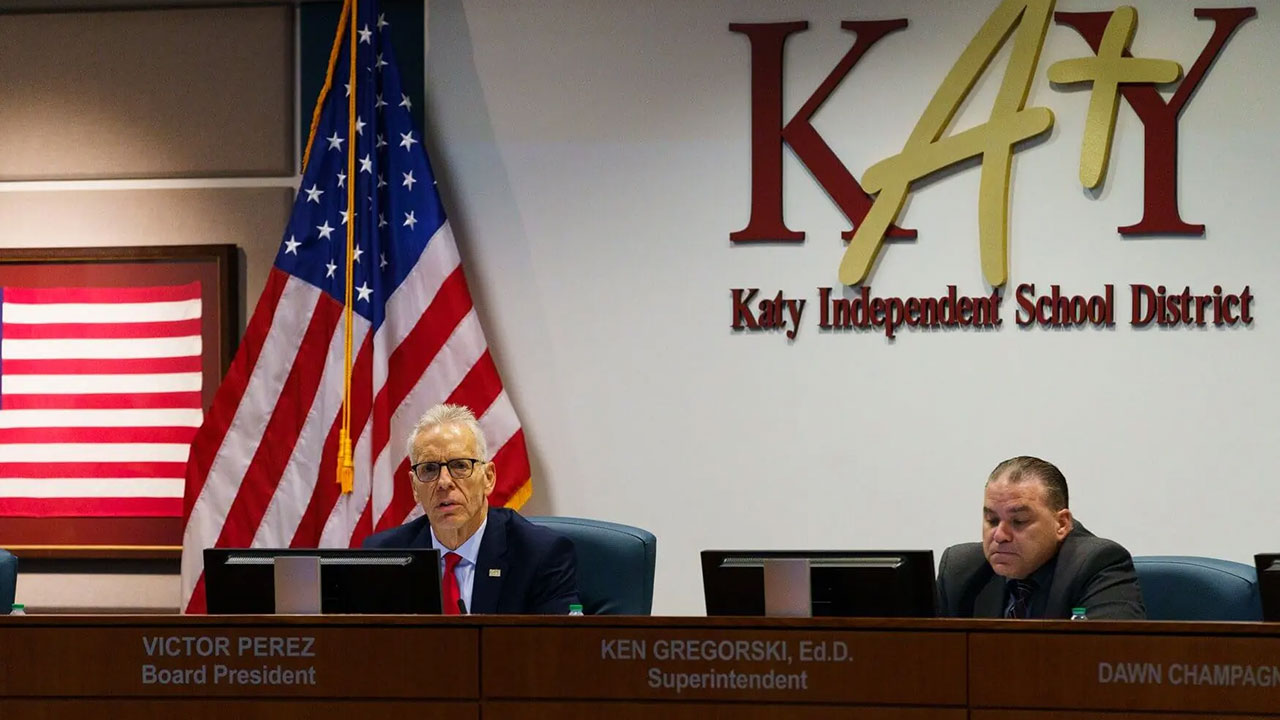
 Since narrowly passing a controversial gender policy two months ago, Katy Independent School District has sent 19 notifications informing parents that their child identified themselves as transgender or requested to use different names or pronouns at school.
Since narrowly passing a controversial gender policy two months ago, Katy Independent School District has sent 19 notifications informing parents that their child identified themselves as transgender or requested to use different names or pronouns at school.
The number of parental notifications, obtained by the Houston Landing through a public records request, is the first glimpse at how often the new, hotly contested policy has been used to disclose LGBTQ+ students’ identities to parents — even if the students aren’t ready.
So far, the district averages a notification to a parent roughly once every three days.
The district’s policy requires staff to inform parents if their student requests to use different pronouns or names, or if they identify themselves as transgender — and obtain written parental consent to comply with the request. It also prohibits employees from asking for students’ preferred pronouns and discussing “gender fluidity,” and requires students to use bathrooms that align with their sex assigned at birth.
Jarred Burton, a student leader at Tompkins High School’s Sexuality and Gender Alliance, said the number of notifications already sent to parents is both depressing and surprising. Critics, including Katy parents, LGBTQ+ students and local advocates, have blasted the policy as a dangerous measure with the potential to expose students’ gender identities to unsupportive parents, further harming a community that already faces a higher risk of mental health issues than their peers.
“It’s just sad to see this actually happening,” Burton said. “It shows that (the policy) is not a bluff.”
Board members who supported the policy hailed it as a measure that would center parents’ right to be informed about their child’s gender identity and protect teachers from making uncomfortable decisions about concealing such information from parents.
“(Parents are) supposed to be looking after the health and welfare of their child,” Board President Victor Perez said at a late August meeting. “Withholding that information from the parent, that is a great burden on staff.”
It’s unclear how many parents were already aware of their child’s gender identity. District officials also did not make any board members available for an interview on the matter.
“The policy is intended to provide parents and guardians the opportunity to be made aware of their child’s name change request, and the opportunity to grant or deny approval of said request,” Katy spokesperson Nick Petito said in a statement Wednesday.
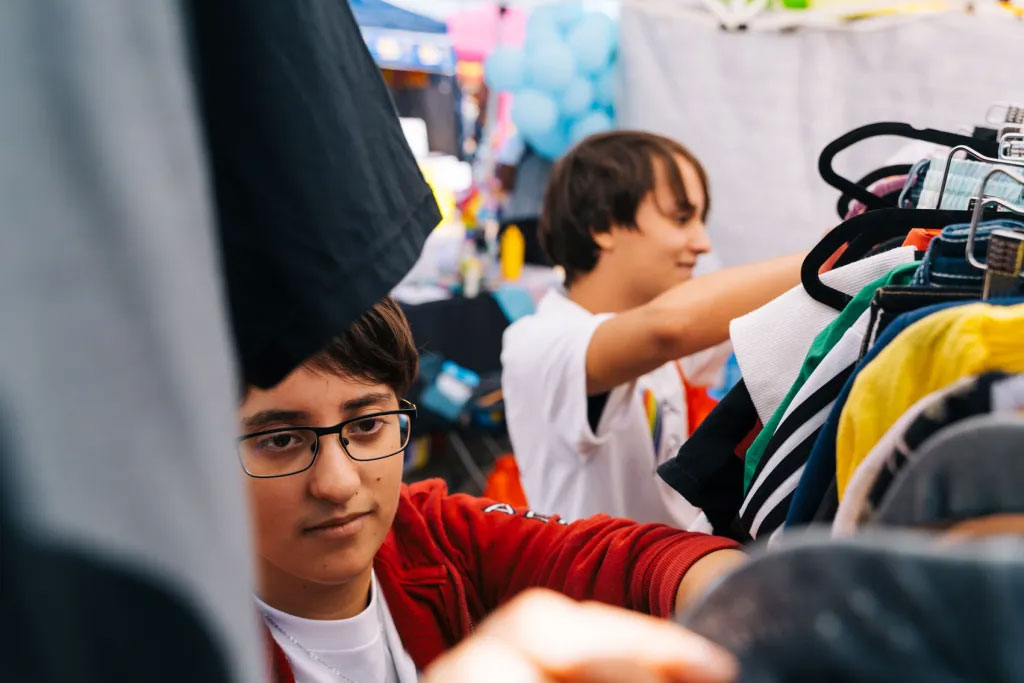
Ash Thornton, a transgender man and a junior at Tompkins High School, said the number of notifications being sent home will discourage LGBTQ+ students from feeling safe to explore their identities.
“It signals that it’s something bad, them being transgender or expressing gender in a way that’s different,” Thornton said. “It definitely messes up student-teacher relationships.”
Employees are not required to comply with a student’s name or pronoun change even if a parent gives consent, the policy states.
One staff member on every campus is responsible for processing and sending notifications to parents and guardians, Petito said. The policy makes an exception for “cases of suspected abuse.”
Students belonging to LGBTQ+ clubs have told the Landing the policy has caused their schools to become less of a safe space and has instilled fear among LGBTQ+ youth in Katy.
“There’s just been this looming cloud of dread over a lot of people,” Burton said in a September interview. “There’s gonna be a lot of people that get in trouble by their parents or get hurt. … It just sometimes keeps me up at night a little bit because it’s hard to imagine how much hate people can have to pass something like this.”
The number of notifications sent to parents to date leaves Thornton to wonder what else is to come.
“It’s only been two months and there’s already 19, how many more people are going to be affected by even just the end of the semester?” he said.
The Houston Landing is a nonprofit newsroom devoted to public service journalism for all Houstonians.
This article first appeared on the Houston Landing and is republished here with permission.



